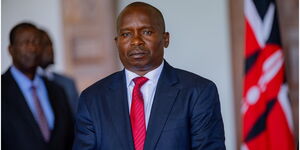In a bid to cut down carbon emissions from the ballooning number of public service vehicles making their way in and out of the city, a Nairobi firm has come up with a solution to cut back on fuel use that contributes greatly to the climate crisis in the country.
Opibus, a startup company is the first of its kind in climate conservation efforts as it aims to refit electric engines into diesel and petrol buses that have the capacity to travel over 250 kilometers a day on a single charge.
The technology behind the electric-powered vehicle is the replacement of the fuel-powered engine by an electric motor whose energy is harnessed into a battery keeping the vehicle charged.
"We remove the internal combustion engine, we replace that with an electric motor, and then we put a battery pack and a control unit to it. Which means that suddenly we no longer have to go to the petrol station to fuel our buses or our vehicles with petrol or diesel," Filip Lovstrom, founder of Opibus stated in an interview with an international publication.
The technology is targeting the public transportation industry by helping stakeholders cut back on their spending on fuel, a move that has been well received by PSV drivers owing to the price fluctuations of the precious commodity.
The estimated cost of refitting an engine is however Kshs5 million ($45,000), which is quite pricey for the average matatu owner, owing to the high cost of importation of auto parts as well as the high taxation of electric components used in assembling the electric buses.
This saw the company receive a Kshs 838 million ($7.5M) boost by Silicon Valley's Fund At One Ventures to foot the cost of fitting the electric engines in the buses.
The funding is to fast-track the modification of the first 52-seater bus into a fully electric vehicle by December 2021.
Mass production of over 20,000 more units will be rolled out to cover Africa's market by 2023.
This comes after President Uhuru Kenyatta promised that Kenya would transition to 100 percent renewable energy by 2030 in the United Nations Climate Conference dubbed COP26 that was held in Glasgow, on Monday, November 1.
"Renewable energy in Kenya currently accounts for 73% of all our installed power generation capacity while 90 per cent of all the electricity we use is from clean sources. We are on course of achieving our target of 100 per cent use of clean energy by 2030," he stated in the conference.
President Kenyatta rooted for an end to carbon emissions as well as an increase in climate financing among member states.












